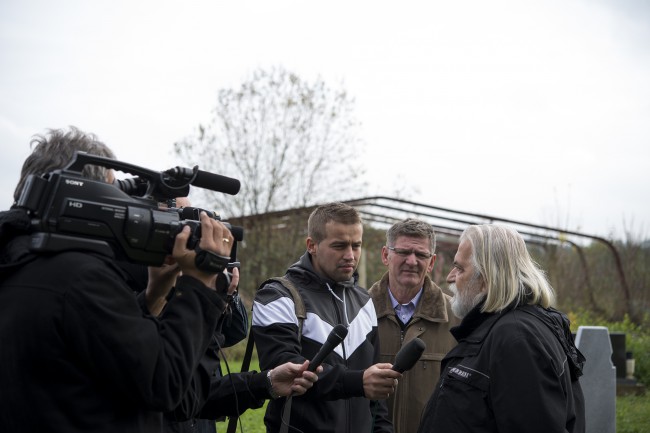The first insights came from school; that we live in a State made up of six republics and two provinces, that it is inhabited by nations and nationalities. Then through the volunteering actions, we were comrades in work brigades; and we built the country. Serving the army, we became fellow soldiers, preparing to defend our country should it come under attack… And then, overnight, we became enemies shooting at each other, destroying what we had built.

A lot of time had passed since all that before some people got the idea of meeting again: comrades from work brigades, fellow soldiers from the army and … veterans who had at one point been enemies, shooting at each other. They say communication is possible with just five hundred words, but even if it takes a couple of thousand, there are just two words without which communication is impossible, two words that are the hardest to say: FORGIVE ME. For the first time, after some ten years or so, we had an opportunity to meet, in Grožnjan, under the patronage of CNA (Centre for Nonviolent Action): us volunteer comrades, fellow soldiers, and ultimately enemies. It was a meeting to remember. All the participants in the workshop will probably remember when one veteran mentioned where he had been fighting only to have a veteran from the opposing side say, “Wait, wait…” and start describing the site of battle in detail, ultimately leading to the discovery that they had been at the same place, only on opposing sides… The story unravelled further during the break in the seminar, over a glass of Istrian red wine. Our next opportunity to meet took place in Bulgaria, on the Black Sea coast. The Centre for War Trauma organised this meeting. Of course, it could not pass without further developments. One evening after the session was over for the day, Croatian and Serbian veterans found themselves together at a local bar. After a few drinks, they started requesting songs to be dedicated either to Croatian or Serbian veterans. The bar fell silent after the dedications were announced. After a while, men of familiar iconography came to the bar. The air was cleared after it was explained that these were veterans, there to attend a seminar, and not to interfere in local affairs. Our next meetings took place at a seminar organised by CNA in Brčko and on Mount Jahorina. It will remain in memory thanks to the bartender who was dumbstruck that this was the only seminar in his work experience that was attended exclusively by men. But the most powerful impression from all the seminars would probably be the arrival to Mount Jahorina. Everyone arrived in their own cars. On the incline just before the tourist centre on Mount Jahorina, the car of one of the veterans stalled and would not start again. As others arrived, seeing the car by the road, they would stop and offer to help… Afterwards, over our first coffee at the hotel, the first question regarding the recent events on the incline was: What would that encounter have been like some ten years ago? After attending all these seminars, a collective idea was born to organise joint visits to memorial sites on all three sides. We started off with certain reservations. But, thanks to the good preparation by the organisers at CNA, the results were better than expected. One such visit took place in Velika Kladuša, where members of the same group had fought each other. We laid flowers at the memorials of both sides together. The most touching moment took place over lunch where once good neighbours who later fought on opposing sides spoke to each other for the first time since the conflict. There were a few hard tears in the eyes of these hard men, the hardest tears of all. The above mentioned encounters of veterans, but even more so those that are not mentioned, are the stuff of novels. Thousands of words could be written about how the veterans set an example that there is a way forward, after everything they had been through, a way to respect differences. But could this novel do what was most important? To move forward, you need to utter that most difficult of phrases FORGIVE ME, or extend your hand to say it without words. All the encounters I mentioned went by without much pomp, more or less unnoticed by the media, except locally, even though all these events were backed up by honesty and a great desire to make sure that what the veterans had suffered would never be inflicted on anyone else ever again. Another
meeting of veterans from all three sides will be held on 29 and 30 May in Kruševac. The main event is to take place on 30 May on Velika Morava by Varvarin where flowers will be laid to pay respects to victims tragically killed during the NATO bombing of the bridge. Everyone is welcome to attend. The author is a veteran and participant in meetings of veterans from different sides.
Ljudevit Kolar
Bulletin for Self-education and Social Issues
Danas, 27.05.2015.